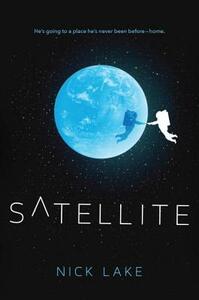Take a photo of a barcode or cover
it took me a whole month to read it. the writing was super poetic which i really liked in the beginning of the book but made the story v slow as it dragged on. i enjoyed the plot and the characters despite the long winded writing.
This book had phenomenal storyline potential but less than wonderful writing. I've had this book sitting on my shelf for years but have never actually got myself to read it, until now. The synopsis and the cover of the book were what really drew me into it, but I found myself wanting more. Firstly, and I am not the first to mention this, the text-speak writing drove me absolutely insane, and honestly, the book lost me in the beginning and lead me to let it sit for a day before persevering my way through it. I have a very big issue with DNF, I can't do it. I have to finish and with this book, I am rather pleased that I did. Looking past the text-speak, the storyline is certainly interesting, and I have yet to read a book similar.
The story is narrated by 15-year-old Leo as he talks about living on Moon 2, a space station 250 miles above Earth. Leo and his two friends (station-mates?) Orion and Libra have grown up on Moon 2 and have never known anything other than 0g. Now that they are of age, however, they are being brought to Earth for the first time. While everyone is excited about what gravity and wind will feel like, Leo can't help but find it weird that everyone is referring to Earth as "home" when, to him, "home" is Moon 2. While life on Earth seems great, with Leo living on a farm with his grandpa and a new puppy, and the twins living in Miami with their mother, Leo comes to learn the truth of why the three of them exist and how life on Earth is truly treating them.
This book did manage to suck me in and even managed to get a few moments of emotions from me but overall, the pace was kind of slow and a lot of the story felt like filler. I think the author could have cut 100 pages out of this book and still gotten all the points across. I did enjoy the subtle LGBTQ+ subplot that felt very natural to the point of a teen but again it was almost unnecessary and like a plot point to establish emotional attachments so the author could just. I feel like the same point could have been made had the author spend more time establishing the relationship between the twins themselves as well as with Leo.
The story is narrated by 15-year-old Leo as he talks about living on Moon 2, a space station 250 miles above Earth. Leo and his two friends (station-mates?) Orion and Libra have grown up on Moon 2 and have never known anything other than 0g. Now that they are of age, however, they are being brought to Earth for the first time. While everyone is excited about what gravity and wind will feel like, Leo can't help but find it weird that everyone is referring to Earth as "home" when, to him, "home" is Moon 2. While life on Earth seems great, with Leo living on a farm with his grandpa and a new puppy, and the twins living in Miami with their mother, Leo comes to learn the truth of why the three of them exist and how life on Earth is truly treating them.
This book did manage to suck me in and even managed to get a few moments of emotions from me but overall, the pace was kind of slow and a lot of the story felt like filler. I think the author could have cut 100 pages out of this book and still gotten all the points across. I did enjoy the subtle LGBTQ+ subplot that felt very natural to the point of a teen but again it was almost unnecessary and like a plot point to establish emotional attachments so the author could just
Spoiler
kill Orion off
The only reason for the 4 instead of a 5 is the format - I am NOT a fan of fiction in verse, loose or otherwise, nor of the text-style writing.
Everything else was great. I loved the story and I laughed quite a bit and I definitely cried and I so appreciate that, although there was science, I never felt disconnected from the story or the characters by its presence. I have a very disparate reaction to Nick Lake, it seems. I never finished “In Darkness” (yes, the award winner) but I inhaled “Hostage Three” and this one. Go figure. 🤓💜📚
Everything else was great. I loved the story and I laughed quite a bit and I definitely cried and I so appreciate that, although there was science, I never felt disconnected from the story or the characters by its presence. I have a very disparate reaction to Nick Lake, it seems. I never finished “In Darkness” (yes, the award winner) but I inhaled “Hostage Three” and this one. Go figure. 🤓💜📚
Didn’t hold my interest. Also, the all lowercase writing and text message abbreviations (especially the use of, “ur”) were off-putting. They didn’t contribute anything other than annoyance.
DNF. I can't stand the writing style. Lowercase everything: c/& instead of see/and...really? The kids seem smart enough to be able to spell and use capital letters. Unimpressed.
Concept: great
Execution: terrible
Regardless of how teens today may or may not communicate on their phones, a story does not need to be written in texting shorthand. It detracted from the story and was obnoxious. It could have worked if it was only used in the protagonist's written communication or similar, but to have an entire book devoid of proper spelling and punctuation was grating, not endearing.
Execution: terrible
Regardless of how teens today may or may not communicate on their phones, a story does not need to be written in texting shorthand. It detracted from the story and was obnoxious. It could have worked if it was only used in the protagonist's written communication or similar, but to have an entire book devoid of proper spelling and punctuation was grating, not endearing.
adventurous
challenging
dark
emotional
funny
hopeful
inspiring
lighthearted
reflective
sad
tense
fast-paced
Plot or Character Driven:
Character
Strong character development:
Yes
Loveable characters:
Yes
Diverse cast of characters:
Yes
Flaws of characters a main focus:
Complicated
I’m so in love with this book and am so very sad to be finished with it. It was an amazing 10/10 read and I love Leo so much. He is so sweet and so strong I wish I could protect him forever.
PLOT
Can home be a place you’ve never even been? A place you can’t even truly understand or imagine. And once you’re back there, is it really home?
Leo has lived all his life on Moon 2, a space station orbiting the earth, with his sibling-friends, twins Libra and Orion. They were born there, apparently by accident, to mothers who were working in orbit at the time, and being children, are deemed not strong enough to return home to earth until their 16th birthdays which are rapidly approaching as we enter the story.
Written from Leo’s perspective, it’s a fascinating look at being a true outcast, having very little human contact and absolutely no experience of everything that we know. We follow him on his journey from 0g to the gravity of earth, into quarantine and to his grandfather’s ranch. The struggles of him trying to understand how to physically and mentally exist in a world he doesn’t recognise as home.
MY THOUGHTS
I’ll address the obvious first; the thing that everyone’s pointing out and is meaning this book is being left unfinished by some: the text speak. “U” is used instead of “you”, “c” instead “see”, and numerical digits instead of the number written out as a word.
As a self-proclaimed grammar stickler (I’ve even got the T shirt), this bothered me at first. A lot. I thought it was because it was YA and written that way to try to fit in with that genre, even though I’m not entirely sure teens even use text speak any more (why bother when we no longer have to use the multi-tap method of typing?). Then I discovered it was because Leo is in space and astronauts write that way in order to convey a message more quickly – every second counts in space – and it made sense. From then on, it still bothered me a little but I eventually stopped seeing it. It seemed to bother me most in dialogue though as it made statements seem more casual and abrupt when that character actually wasn’t really that way, but that’s really the only issue I had with it in the later parts of the book.
Moving past that though, the rest of the writing was wonderful. Descriptions that can only be described as luxurious; perceptions of earth, of “home”, as being a completely new experience. The only experiences Leo and his friends have of earth is those in books, films, TV shows and what the Company chooses for them to see.
After finishing the book, I found myself actually thinking hard about the sensations described that I normally take for granted: gravity dragging me down to the ground; the feeling of a mattress pushing back up against me, the duvet weighing me down; scents in the moving air; the sound of birds wings; and tastes. All the tastes. The way that all of these things and more became so real for me that I was appreciating things I never would have thought twice about before.
The wider world the book is set in is fantastic. We’re in the near future, on a struggling earth, which is only made apparent through dropped hints and accidentally let-on secrets. NASA has been privatised, the Company (as they’re unsettlingly referred to) alone holds the monopoly on space. But the world is a different place to the one we know. Men are casually referred to as wearing mascara and nail polish. It’s stated as part of character-building occasionally, and as it’s all from Leo’s perspective, we see that this is not a big deal. Masculinity is being worn down. This is even more apparent thanks to Leo’s attraction to men rather than women, and the way that it’s so fleetingly referred to, like the make up, as if it’s the most natural thing, rather than being made a big deal of as so many YA novels might do. This was brilliant and I’d love to see more of it.
To be completely honest, I went into this book not really expecting not to like it all that much. Yes, it’s YA and it fits one of my favourite genres of isolated landscapes, but I thought it was going to be childish and stereotypical YA-y based – I have to stop thinking this because apparently I like that stereotype! There wasn’t an overload of romance like I was expecting (in fact, there was barely any aside from the occasional attraction) and it went much deeper than I expected. I honestly loved it. It was described as The Martian for teens in the description which drew me (as I loved The Martian) so I should have believed that!
The only thing that could have made the book better was if we got to see more of the world that’s been created around the story, but I understand that seeing it through Leo’s eyes, there’s only so much we could be shown. I’d be happy to read more books set in this landscape.
I really hope this book gets the attention it deserves. I can honestly see it being made into a film – it has space, it has adventure, it has emotion, and it has a really good story line. In fact, it felt like watching a film while reading it. I hope that happens!
Can home be a place you’ve never even been? A place you can’t even truly understand or imagine. And once you’re back there, is it really home?
Leo has lived all his life on Moon 2, a space station orbiting the earth, with his sibling-friends, twins Libra and Orion. They were born there, apparently by accident, to mothers who were working in orbit at the time, and being children, are deemed not strong enough to return home to earth until their 16th birthdays which are rapidly approaching as we enter the story.
Written from Leo’s perspective, it’s a fascinating look at being a true outcast, having very little human contact and absolutely no experience of everything that we know. We follow him on his journey from 0g to the gravity of earth, into quarantine and to his grandfather’s ranch. The struggles of him trying to understand how to physically and mentally exist in a world he doesn’t recognise as home.
MY THOUGHTS
I’ll address the obvious first; the thing that everyone’s pointing out and is meaning this book is being left unfinished by some: the text speak. “U” is used instead of “you”, “c” instead “see”, and numerical digits instead of the number written out as a word.
As a self-proclaimed grammar stickler (I’ve even got the T shirt), this bothered me at first. A lot. I thought it was because it was YA and written that way to try to fit in with that genre, even though I’m not entirely sure teens even use text speak any more (why bother when we no longer have to use the multi-tap method of typing?). Then I discovered it was because Leo is in space and astronauts write that way in order to convey a message more quickly – every second counts in space – and it made sense. From then on, it still bothered me a little but I eventually stopped seeing it. It seemed to bother me most in dialogue though as it made statements seem more casual and abrupt when that character actually wasn’t really that way, but that’s really the only issue I had with it in the later parts of the book.
Moving past that though, the rest of the writing was wonderful. Descriptions that can only be described as luxurious; perceptions of earth, of “home”, as being a completely new experience. The only experiences Leo and his friends have of earth is those in books, films, TV shows and what the Company chooses for them to see.
After finishing the book, I found myself actually thinking hard about the sensations described that I normally take for granted: gravity dragging me down to the ground; the feeling of a mattress pushing back up against me, the duvet weighing me down; scents in the moving air; the sound of birds wings; and tastes. All the tastes. The way that all of these things and more became so real for me that I was appreciating things I never would have thought twice about before.
The wider world the book is set in is fantastic. We’re in the near future, on a struggling earth, which is only made apparent through dropped hints and accidentally let-on secrets. NASA has been privatised, the Company (as they’re unsettlingly referred to) alone holds the monopoly on space. But the world is a different place to the one we know. Men are casually referred to as wearing mascara and nail polish. It’s stated as part of character-building occasionally, and as it’s all from Leo’s perspective, we see that this is not a big deal. Masculinity is being worn down. This is even more apparent thanks to Leo’s attraction to men rather than women, and the way that it’s so fleetingly referred to, like the make up, as if it’s the most natural thing, rather than being made a big deal of as so many YA novels might do. This was brilliant and I’d love to see more of it.
To be completely honest, I went into this book not really expecting not to like it all that much. Yes, it’s YA and it fits one of my favourite genres of isolated landscapes, but I thought it was going to be childish and stereotypical YA-y based – I have to stop thinking this because apparently I like that stereotype! There wasn’t an overload of romance like I was expecting (in fact, there was barely any aside from the occasional attraction) and it went much deeper than I expected. I honestly loved it. It was described as The Martian for teens in the description which drew me (as I loved The Martian) so I should have believed that!
The only thing that could have made the book better was if we got to see more of the world that’s been created around the story, but I understand that seeing it through Leo’s eyes, there’s only so much we could be shown. I’d be happy to read more books set in this landscape.
I really hope this book gets the attention it deserves. I can honestly see it being made into a film – it has space, it has adventure, it has emotion, and it has a really good story line. In fact, it felt like watching a film while reading it. I hope that happens!
A little slow to start but towards the end I had a hard time putting it down.
I loved the way this book expressed living in space and hie that affected the transition back to Earth. The emotions in this story were conveyed well too.




